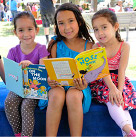The weight of the pandemic has been, for many of us, overwhelming at times and child care providers, especially, know this burden.
To avoid burnout, Child Care Resource Center’s Family Well-Being Manager has some important tips.
The stress that comes with providing child care has long been acknowledged in the news and national studies on burnout but those feelings of anxiety are being reported at even higher rates now due to the pandemic. CCRC Family Well-Being Manager Rosario Williams says self-care is a critical component of maintaining mental wellbeing.
“When we hold on to things for so long, there comes a point we can’t hold on any more,” Rosario says. “If you have a trash can and keep throwing things in there like yesterday’s lasagna, today’s eggs, a pizza slice from lunch – if you don’t take it out for a week, what happens? It stinks and rots. Our hearts and minds are containers and when we don’t clean and clear them out, they get overloaded.”
Rosario says self-care may look different for each individual but she argues it’s an essential practice for providers, as well as parents and children.
“Adults have the capacity to be more complex in their self-care,” Rosario says. “What energizes you? Select activities that are restful and rejuvenating, it doesn’t have to cost money.”
Here are Rosario’s tips for adults:
- Create an actionable self-care plan now that can be implemented later under a state of duress: This list can include things that are active, connecting with nature or creative (cooking, crafting, writing). After creating the list of activities, weed it down to the activities that are realistic.
- Create a personal acronym for your plan, like CALM: Cooking, Affirmations, Learning (reading a book), Meditating. That word serves as an easy reminder of ways to unwind in the moment.
- Some people will benefit from a rush of adrenaline, such as exercise or movement. Others may see the best results from stillness in nature, activities like meditation or simply standing outside in the garden and breathing deeply. Controlled breathing is a very effective way to come back to center.
- Starting the day with an affirmation, something like “I’m willing to learn new things,” is a great way to enter the day with positive energy.
Adults aren’t the only ones who experience anxiety and stress; children faced with mental health challenges are less skilled at coping.
“Self-care for children is more active, incorporate their bodies through play,” Rosario says. “Breathing is important, too.”
Here are Rosario’s tips for children:
- Encourage deep breathing by inviting the child to smell the flowers in the garden. Controlled, deep breaths can have a calming effect on the child. Blowing bubbles are another great way to encourage steady inhales and exhales.
- Parents can also have their child lay down and put their favorite stuffed animal on their belly to teach them how to breathe. The child can observe how the stuffed animal rises and falls on their tummy as they breathe.
“Sometimes our culture frowns upon self-care,” Rosario says. “I grew up with my mom saying ‘a mom doesn’t get tired.’ But we do get tired and in order to keep going, we have to take care of ourselves, physically and mentally.”


